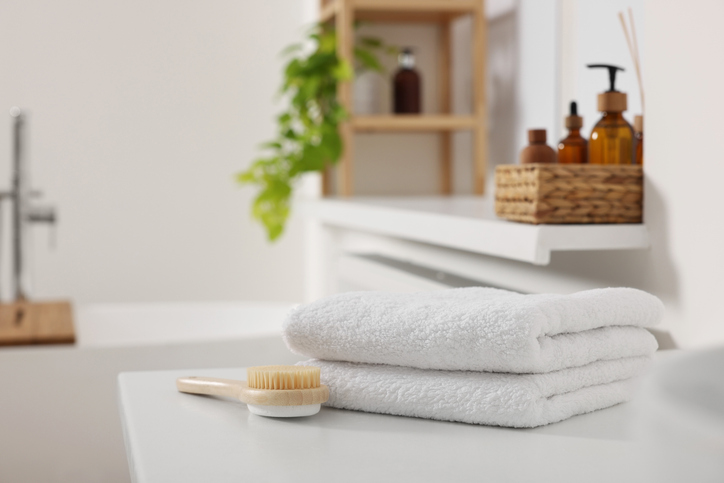
It’s no secret that staging a home in the right way can help entice potential buyers, but how can Realtors® improve their staging skills and reign in more business? With over 15 years of experience, Nikki Watson, the owner of top-ranked home staging company The Design Quad, based in Dallas, Texas, shares some of her insider staging tips.
Why Stage?
“Potential buyers feel staged homes are well cared for and are more willing to present an offer, therefore resulting in more sales for the agent,” says Watson.
“Knowing the psychology behind how people emotionally purchase homes can help increase their business,” she notes. “Professionally staged homes give agents a great marketing advantage above their competition. If all of their properties are presented with home staging before listing, their portfolio will improve, and they will win more listings with sellers.”
What Are Your Most Unexpected Home Staging Tips?
1. White Towels
“Making a bathroom feel like a spa is vital in this self-care age,” Watson advises. “Folding or rolling white towels in the bathroom sends a message to buyers that the bathroom they are viewing is a relaxing place, and their life will be calm and spa-like.”
2. TV Placement
“Place the TV in the area it will most likely be mounted,” she encourages. “We use faux televisions for a reason – most male buyers want to know where the TV will be hung. Spelling this out leaves nothing to the imagination, and for visual buyers, this is the key to closing the deal.”
3. Furniture Arrangement
“Never walk into the back of the couch (or any furniture,” Watson says. “When walking into a house or a room, if the back of the furniture is facing the door, the room immediately feels cut off. Almost like a STOP sign.”
Watson recommends making sure each room feels open and welcoming by keeping the backs of furniture pieces away from entryways. She adds, “If the furniture stops them at the door, buyers will feel blocked and most likely immediately want to leave.”
4. 60/40 Closets
“In an occupied home, the rule is 60/40 for closets. If a buyer walks in and sees the closets completely full, they will think there is not enough room for their items, even if they don’t have as much as the seller.”
“I tell sellers to keep all closets 60% full, so it looks like they actually live there, and 40% empty,” Watson says. “That way, the buyer sees plenty of room for their belongings and they won’t have the image of not enough storage in their home.”
5. The Garage
“Do not overlook the garage,” she adds. “The garage is one of the most popular areas for people doing videos online. I see a new workout video every day, and the person is in their garage. We are using them for all kinds of things these days, and if it is full of ‘downsized’ boxes, buyers can’t get an idea of what they can do with the space.”
“The garage is real estate also,” she reminds Realtors®. “I tell sellers to keep it as clean as possible.”
What Are Some Common Mistakes?
1. Messy Garages
“Having sellers declutter and telling them to shove everything in the garage?” Watson asks. “Big NO NO.”
2. Pet Items
“Not advising them on how to properly put away any pet items. When scrolling pictures in the MLS, buyers who see dog bowls or cat trees may associate those items with a smell, and they will take that home off of the list. Most of the time agents don’t want to offend sellers by asking them to remove these items for pictures, but this can be a major deterrence.”
3. Keeping Quiet
“Some agents are afraid to lose the listing by saying the hard things to the sellers,” Watson adds. Explaining the benefits of home staging and home presentation can help clients understand what sells.
Current Trends or Neutral Designs?
“Always use a neutral base, including furniture color/style, and add in trends in small doses,” she advises. “If it is too trendy, you will not appeal to the highest number of buyers. It needs to stay in the transitional style for a broader appeal.”
Where Can Realtors® Start?
Watson recommends taking a home staging class with a local home stager or with staging associations such as the Real Estate Staging Association and the International Association of Staging Professionals.
“Whether an agent looks to gain staging skills or partner with a local home stager, it is imperative to incorporate home staging into their business to present well for a fast sale,” she concludes.
Topics
Member Discussion
Recent Articles
-
Keystone to Sunshine: Pennsylvania Migration Trends
- December 3, 2024
- 2 min. read
In 2022 alone, an estimated 262,700 Americans relocated to Pennsylvania, which was the ninth most popular state for movers.
-
Homebuyers Searching for Sense of Community
- December 2, 2024
- 2 min. read
According to a Century21 report, 92% of recent/intending homebuyers said it’s important their real estate agent has insight into how the community will grow in the future.
-
Americans Making Longer Commutes Again
- November 29, 2024
- 2 min. read
Although commute times are increasing again, research from NAR suggests they may not play a significant role in homebuyers’ decisions.
Daily Emails
You’ll be the first to know about real estate trends and various legal happenings. Stay up-to-date by subscribing to JustListed.



